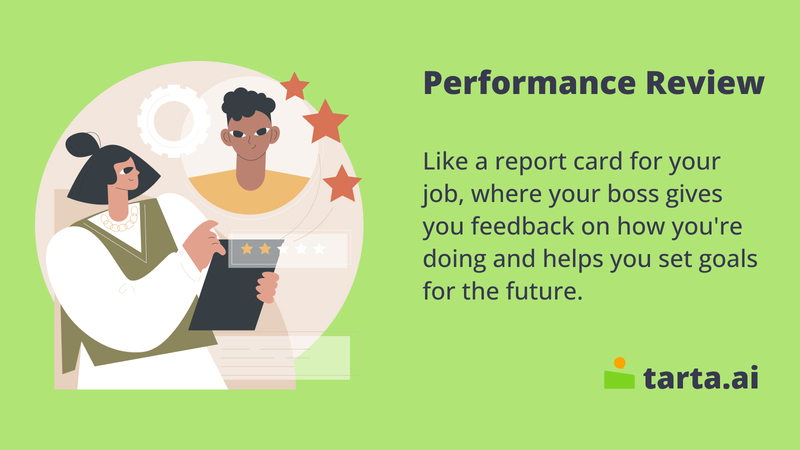Performance Reviews: What They Are and Why They Matter?
A performance review is a process by which an employee's job performance is evaluated by their employer. This evaluation can take many different forms, but typically involves a one-on-one meeting between the employee and their supervisor, during which the supervisor provides feedback on the employee's strengths and areas for improvement.
Performance reviews are important for both employees and employers. For employees, performance reviews provide valuable feedback that can help them improve their job performance and advance in their careers. For employers, performance reviews help identify high-performing employees and those who may need additional training or support.
In this article, we will cover the basics of what a performance review is, the different types of performance reviews, the benefits of performance reviews, how to prepare for a performance review, how to conduct a performance review, and what to do after a performance review.
What Is a Performance Review?
A performance review is a formal evaluation of an employee's job performance that is conducted by their employer. The purpose of a performance review is to provide feedback on the employee's strengths and areas for improvement, and to set goals for future performance. The review may also be used to determine whether the employee is meeting the requirements of their job and to identify areas where additional training or support may be needed.

Performance reviews are typically conducted by the employee's immediate supervisor or manager, although in some cases they may be conducted by a higher-level manager or a human resources representative. The review process usually involves a one-on-one meeting between the employee and the person conducting the review, during which the employee is given feedback on their performance and opportunities to ask questions and provide feedback of their own.
Exploring Various Types of Performance Evaluations
There are several types of performance reviews that employers may use to evaluate employee performance. Some of the most common types include:
- Annual performance reviews: These are typically conducted once a year and provide a comprehensive evaluation of the employee's performance over the previous 12 months.
- 360-degree feedback reviews: In this type of review, feedback is gathered from a variety of sources, including the employee's supervisor, peers, subordinates, and sometimes even customers or clients.
- Continuous performance management: This approach involves ongoing feedback and coaching throughout the year, rather than waiting for an annual or semi-annual review. This can include regular check-ins, goal-setting sessions, and informal feedback.
- Other types of performance reviews: Some employers may use additional types of reviews, such as self-assessment reviews, which ask employees to evaluate their own performance, or project-specific reviews, which evaluate performance on a specific project or task.
Each type of performance review has its own strengths and weaknesses, and employers may choose to use a combination of approaches to evaluate employee performance.
Interesting fact:
The concept of performance reviews dates back to the early 20th century, when Frederick Taylor introduced the idea of "scientific management" to improve workplace efficiency.
Advantages of Conducting Performance Reviews in the Workplace
Performance reviews offer numerous benefits for both employees and employers. Some of the key benefits of performance reviews include:
For Employees | For Employers |
Career Development Performance reviews provide employees with valuable feedback on their strengths and areas for improvement, which can help them develop their skills and advance in their careers. | Identifying High/Low Performers Performance reviews can help employers identify high-performing employees who may be suitable for advancement or additional training, as well as employees who may be struggling and in need of additional support. |
Feedback Performance reviews allow employees to receive feedback on their performance from their supervisors or managers, which can help them identify areas where they can improve and build on their strengths. | Improving Employee Engagement Performance reviews can help to improve employee engagement by providing employees with clear expectations and goals, and offering them opportunities for feedback and career development. |
Recognition Performance reviews offer an opportunity for employees to receive recognition for their hard work and accomplishments, which can help to boost morale and increase motivation. | Goal Setting Performance reviews can help employers set goals for their employees that are aligned with the company's overall objectives, which can help to improve productivity and performance. |
Overall, performance reviews offer a valuable opportunity for both employees and employers to evaluate performance, provide feedback, and set goals for future success.
Interesting fact:
Continuous performance management is an ongoing process that involves regular check-ins and feedback, rather than a once-a-year review.
Effective Strategies for Preparing Yourself for a Performance Evaluation
Both employees and employers should take steps to get ready for a performance review to ensure a successful and productive meeting. Here are some tips on how to prepare:
For Employees | For Employers |
Review Your Job Description Reviewing your job description can help you understand the expectations for your role and plan to discuss your performance in those areas. | Collect Performance Data Collect data on employee performance, such as sales figures, customer satisfaction ratings, and project completion rates. This can help you provide specific examples of employee performance during the review. |
Set Goals Set specific goals for yourself that align with the company's objectives and your own career development. | Review Employee Goals Review the employee's goals from the previous review period and prepare to discuss progress towards those goals. |
Collect Examples Collect examples of your work that demonstrate your accomplishments and contributions to the company. | Prepare Feedback Prepare specific feedback on the employee's performance, including areas of strength and areas for improvement. |
By taking these steps to prepare for a performance review, both employees and employers can have a more productive and meaningful discussion about job performance and career development.
Interesting fact:
The 360-degree feedback review process involves gathering feedback from a range of sources, including managers, peers, subordinates, and customers.
Guidelines for Conducting a Productive Performance Evaluation
Conducting a performance review can be a challenging task for both employers and employees. Here are some dos and don'ts to keep in mind when conducting a performance review:
Dos | Don'ts |
Be Specific Provide specific examples of employee performance, including areas of strength and areas for improvement. | Avoid Personal Biases Avoid personal biases or assumptions about the employee, and focus on objective performance data. |
Focus on Behaviors Focus on specific behaviors and actions, rather than personal characteristics or biases. | Don't Be Vague Don't use vague or unclear language that may leave the employee uncertain about their performance or expectations. |
Listen Carefully Listen carefully to the employee's feedback and concerns, and work collaboratively to develop solutions to any issues that arise. | Don't Be Defensive Don't become defensive or dismissive of the employee's feedback or concerns. |
Set Clear Goals Set clear goals and expectations for future performance, and work with the employee to develop a plan to achieve those goals. |

Giving and receiving feedback is an important part of the performance review process. Here are some tips for giving and receiving feedback during a performance review:
- How to give feedback?
- Be specific and objective
- Use "I" statements to avoid appearing accusatory
- Offer constructive criticism
- Focus on solutions, not just problems
- How to receive feedback?
- Listen actively and try to understand the feedback
- Avoid getting defensive or emotional
- Ask questions for clarification
- Take time to reflect on the feedback and develop a plan for improvement
By following these guidelines, both employers and employees can have a productive and effective performance review that leads to improved performance and career development.
Follow-Up after a Performance Review
Following up after a performance review is important to ensure that the feedback provided is acted upon and that the employee and employer are aligned on goals for future performance. Here are some tips on how to follow up after a performance review:
Acting on Feedback:
- Reflect on the feedback received during the performance review and identify specific areas for improvement.
- Develop a plan of action for addressing areas for improvement, including specific steps and timelines.
- Seek support or additional resources if needed, such as training or mentorship.
Interesting fact:
Organizations that conduct regular performance reviews have higher levels of employee engagement and productivity.
Next Steps:
- Set Goals: Set specific goals for future performance, based on the feedback received during the performance review.
- Schedule a Follow-Up Meeting: Schedule a follow-up meeting with the employer or supervisor to review progress towards goals and discuss any additional feedback or concerns.
- Communicate Regularly: Communicate regularly with the employer or supervisor to keep them updated on progress towards goals and to seek additional feedback or support if needed.
By following up after a performance review, employees can demonstrate their commitment to improving their performance and achieving their goals, while employers can provide ongoing support and feedback to help their employees succeed.
In conclusion, performance reviews are an important tool for both employees and employers to improve job performance and career development. Throughout this article, we have discussed what performance reviews are, the different types of performance reviews, the benefits of performance reviews, how to prepare for a performance review, dos and don'ts of conducting a performance review, and how to follow up after a performance review. By conducting performance reviews on a regular basis and following up on the feedback provided, employees can improve their skills and abilities, while employers can improve engagement and productivity in the workplace. Overall, performance reviews are a critical component of ongoing employee development and organizational success.
- Performance reviews are a tool used by employers to evaluate and provide feedback on an employee's job performance.
- There are different types of performance reviews, including annual reviews, 360-degree feedback reviews, and continuous performance management.
- Performance reviews offer benefits to both employees and employers, such as career development, feedback, recognition, and identifying high/low performers.
- To prepare for a performance review, employees should review their job description, set goals, and gather feedback from colleagues, while employers should collect performance data.
- During a performance review, it is important to be specific and objective, focus on behaviors, and listen carefully to feedback.
- After a performance review, employees should act on feedback received, set goals, and communicate regularly with their employer.
- Performance reviews are a critical component of ongoing employee development and organizational success.
FAQ
How often should performance reviews be conducted?
The frequency of performance reviews varies by organization, but they are typically conducted on an annual basis. Some companies may conduct them more frequently, such as quarterly or bi-annually, while others may conduct them less frequently, such as every two years.
What types of questions are asked during a performance review?
The questions asked during a performance review vary by organization, but they typically focus on job performance, goals, and career development. Examples of questions include: "What are your strengths and weaknesses?", "What goals do you have for the coming year?", and "What support do you need from the company to achieve your career goals?"
What should employees do to prepare for a performance review?
To prepare for a performance review, employees should review their job description, gather feedback from colleagues and customers, and set goals for the future. They should also be prepared to discuss their strengths, areas for improvement, and career development goals.